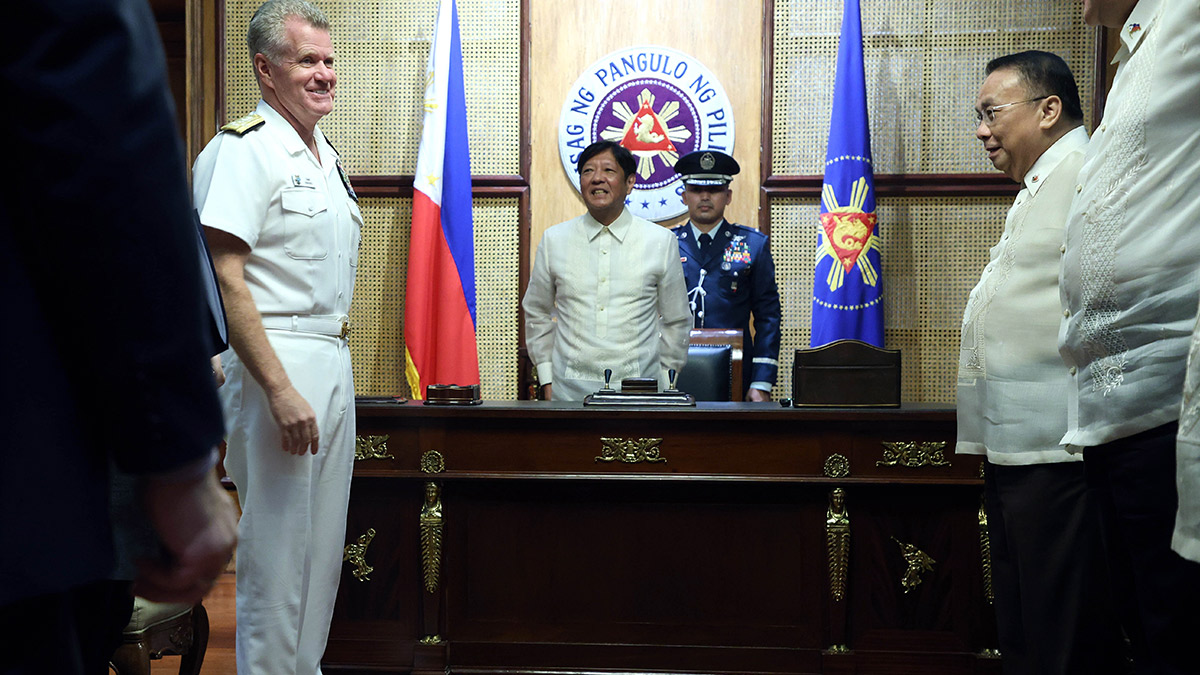
US FLEET CHIEF IN TOWN Adm. Samuel Paparo Jr., chief of the US military’s Indo-Pacific Command (left), makes a courtesy call on President Marcos at Malacañang on Tuesday, when Manila also hosted an international military forum organized by the US command. —Marianne Bermudez
MANILA, Philippines — United States ships could escort Philippine vessels on resupply missions in the South China Sea, a top admiral said on Tuesday, describing what he called “an entirely reasonable option” that required consultation between the treaty allies, however.
The remarks, which are likely to annoy China, were made by Samuel Paparo Jr., commander of the US Indo-Pacific Command, after a series of maritime and air confrontations between the Philippines and China in the South China Sea in the past week.
READ: PCG ships blocked by Chinese vessels during Sabina resupply – report
Beijing has pressed its claim to the disputed conduit for more than $3 trillion of annual ship-borne commerce, while Manila has kept up supply missions, particularly those to a beached naval ship on the hotly contested Ayungin (Second Thomas) Shoal.
“Escort of one vessel to the other is an entirely reasonable option within our Mutual Defense Treaty,” Paparo told reporters on the sidelines of a military forum organized by the Indo-Pacific Command.
Alternatives
He was responding to a query whether Washington would consider providing escorts to ships from the Philippines taking supplies to disputed geographical features in the waterway.
“I mean certainly, within the context of consultations,” Paparo added, without giving details of ships likely to be employed for the task.
Armed Forces of the Philippines chief of staff Gen. Romeo Brawner Jr. said the southeast Asian nation preferred to run those missions on its own, however, making every effort to ensure their success despite what Manila calls China’s “dangerous” and “coercive” actions.
“We are going to try all options, all avenues that are available to us,” Brawner told reporters. “While we can do it by ourselves, we will do it.”
But the Philippines would seek alternatives if it found itself constrained from doing so, he added.
“It’s not just perhaps operating with the United States, but also with other like-minded nations.”
Treaty application
Washington is bound by a Mutual Defense Treaty dating from 1951 to defend the Philippines in case of armed attacks on its forces, public vessels, or aircraft in the South China Sea.
That treaty must be interpreted more broadly to tackle a “dynamic and cunning adversary,” Defense Secretary Gilberto Teodoro Jr. told reporters, although it has already proved a “great deterrent” in the South China Sea.
In recent years, the Philippines has complained of China’s use of so-called grey-zone tactics, or coercive actions that are just shy of armed conflict. But China has maintained its actions were professional and lawful.
‘Disruptor of peace’
Teodoro also urged regional nations to call out China, which he described as the “biggest disruptor of peace,” for its activities in the waterway.
“I believe they’re not undeterrable, because it’s just a question of getting a worldwide consensus,” Teodoro said.
He said the international community should call out China for its “illegal acts” when asked how other countries could help Manila.
“Call out China for illegal acts, the 40 of you,’’ Teodoro said, addressing the representatives of 40 countries represented in the conference held at the Manila Hotel.
“Make a lot of maps and sustain the call until China behaves… Only a collective effort to call them out amidst their very strong information and charm drive abroad,” he added.
“Ask (Chinese) diplomats to say: What are you doing in the South China Sea? Why are you claiming ownership over the whole of the South China Sea? What is your basis for that? We cannot deal with you… I think that calling a spade a spade is now time.”
For ‘relevant’ Asean
The Association of Southeast Asian Nations (Asean), he noted, is “slowly… getting some consensus and conferences like this. You saw the Asean attendance, they are paying attention.’’
“Asean, to remain relevant and credible, cannot continue to ignore what China is doing in the South China Sea… The antidote is a stronger collective multilateral action.”
Teodoro’s comments came following back-to-back tense incidents between Manila and Beijing near Escoda (Sabina) Shoal in the West Philippine Sea this week.
Creating sufficient deterrence militarily was critical for the Philippines to show China it was serious about protecting its sovereignty, and which it would fight for, he added.
China claims sovereignty over nearly all of the South China Sea, including areas claimed by Brunei, Indonesia, Malaysia, the Philippines, Taiwan and Vietnam. Beijing has deployed an armada of vessels to protect its claims.
In 2016, an international arbitration tribunal ruled that Beijing’s claim had no basis under international law in a landmark victory for the Philippines, which filed the case. Beijing rejects that decision. —with a report from Frances Mangosing
For comprehensive coverage, in-depth analysis, visit our special page for West Philippine Sea updates. Stay informed with articles, videos, and expert opinions.

